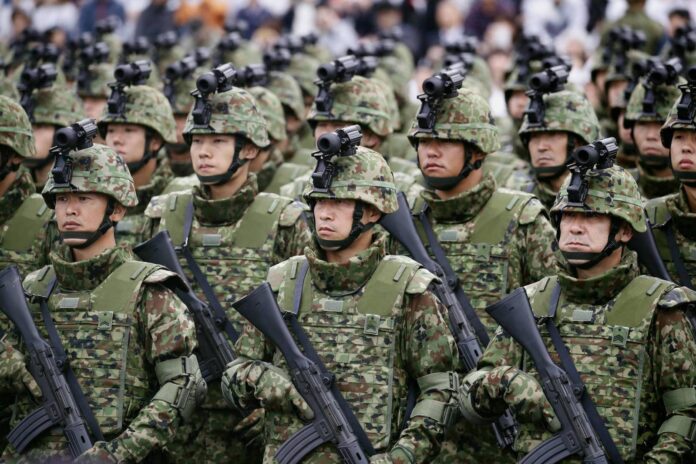This article first appeared on Pacific Forum and is republished with kind permission. Read the original here.
Taiwan hopes that if China attacks Taiwan that Japan will come to its rescue.
A poll conducted by the Tokyo-based Central Research Services on the behalf of the Taipei Economic and Cultural Representative Office in Japan found that 77% of Japanese feel close to Taiwan. Of the survey group, 72.8% said that the relationship between Taiwan and Japan is “good” or “somewhat good,” while only 1.2% said it was “bad” or “somewhat bad.”
Perhaps it’s because of numbers like this that nearly 60% of Taiwanese believe Japan would dispatch the Self-Defense Forces to come to their assistance in the event of an attack by China, according to a 2021 Taiwanese Public Opinion Foundation poll.
Are such hopes misplaced?
“People greatly admire Taiwan, they love Taiwan. One of the reasons they love Taiwan is no other country in the world loves Japan as much as the Taiwanese But there is a big gap between that sort of warm and fuzzy ‘we like you, admire you’ and all that, and sending troops into harm’s way,” Jeffrey Kingston, a professor of Asian Studies at Temple University, Tokyo, told Voice of America.
“There is an expectation in Washington that Japan would intervene, and I think [the] political leadership of the Liberal Democratic Party thinks they should intervene, but the public is extremely leery of Japan going beyond its pacifist constitution,” he said.
All of this seems at odds with the constant visits to Taiwan by Japanese VIPs proclaiming “Taiwan’s defense is Japan’s defense.” Yet, other than a recent Japanese Coast Guard exercise with a Taiwan Coast Guard ship, the Japan Self-Defense Force (JSDF) does not maintain a defense relationship with the Taiwan military.
Another good example is Deputy Prime Minister Aso Taro, who said that Japan and the US would have to defend Taiwan if China invaded. However, his statement was not backed up by the Japanese government.
Other than a history of pacifism and a missing defense relationship between Japan and Taiwan, a key reason Japan has been so historically hesitant about making commitments to Taiwan is the Chinese economy. The China market at one time represented 40% of Japanese exports.
However, the Chinese market is not as attractive to Japan as before because of the difficulties in doing business there. Japanese corporations are pulling out of China and diversifying their external investments to countries where the operating environment is friendlier. Still, nearly 30% of Japanese exports are China-bound and such a dependency would hinder, perhaps fatally, any meaningful preparations for conflict.
According to Nakano Koichi, a professor in comparative and Japanese politics at Tokyo’s Sophia University, “Abe even said that a war in Taiwan—a ‘contingency in Taiwan’—would be Japan’s contingency, but that’s a very extreme position that is not really covered or discussed in Japan.”
In 2015, when then-Prime Minister Shinzo Abe pushed through a major change to Japan’s pacifist constitution, lifting a ban on “collective self-defense,” he pitched the change domestically to protect Japan and move closer to the US, Nakano said. It was not a way to enter a foreign war. The move remains deeply controversial within Japan where it was seen by much of the legal community as an attack on Japanese democracy, Nakano said.
Japan has defense policies that lead up to the passage of the 2015 Legislation for Peace and Security and benefit Taiwan. The 1996 shuhen jitai commits Japan to defend areas close to Japan. China demanded that Taiwan be exempt; however, Japan refused.
In 2014, the cabinet reinterpreted Article 9 of the constitution. The result allowed Japan to protect another country if an attack on that country was thought to be an existential threat to Japan. Such a reinterpretation strengthened the shuhen jitai.
However, the public does not advocate a greater role for Japan in the region. A poll conducted in 2023 shows that nearly 80% of Japanese disapprove of tax hikes to cover Japan’s increased defense expenditures. This will complicate, perhaps fatally, government efforts to prepare the JSDF to make a decisive difference in a Taiwan Strait contingency.
Massive increases in Japanese military expenditure are likely too little, too late to reduce dependence on the US in the event of a possible Taiwan war. The JSDF, year after year, misses its recruitment goal. The result is it’s an old, undermanned, and overworked force.
Basically, the JSDF has little popular support and respect. And adding to the JSDF woes is a shrinking population and competition from the private sector. The low pay and substandard living conditions further make a JSDF career unattractive.
The bright spot of the JSDF is the Japanese Maritime Self Defense Force (JMSDF), believed to be the strongest in the region after America’s and thus superior to China’s still underdeveloped but steadily growing naval forces. The JMSDF, however, won’t be enough to turn the tide in war.
The Japanese relationship with Taiwan is based on a non-governmental relationship. Because of economic and strategic concerns, Japan walks a tightrope with China, trying not to show favor to China or Taiwan.
Therefore, Japan will not establish formal diplomatic relations with Taiwan, is unlikely to create a Taiwan Relations Act with Taipei and will not sell any lethal military hardware to Taiwan.
If the leadership of Japan wishes to truly support Taiwan before a conflict starts, it must further reduce dependence on the Chinese market and make the JSDF a credible fighting force. Until it does so, “warm and fuzzy” declarations may be all it has to offer.
Bill Sharp (we.sharp@gmail.com) is an associate of the Center for Chinese Studies at the University of Hawaii, Manoa and adjunct senior fellow at Pacific Forum. Over a period of 23 years, he taught East Asian politics at Chaminade University of Honolulu, Hawaii Pacific University and the University of Hawaii, Manoa.

